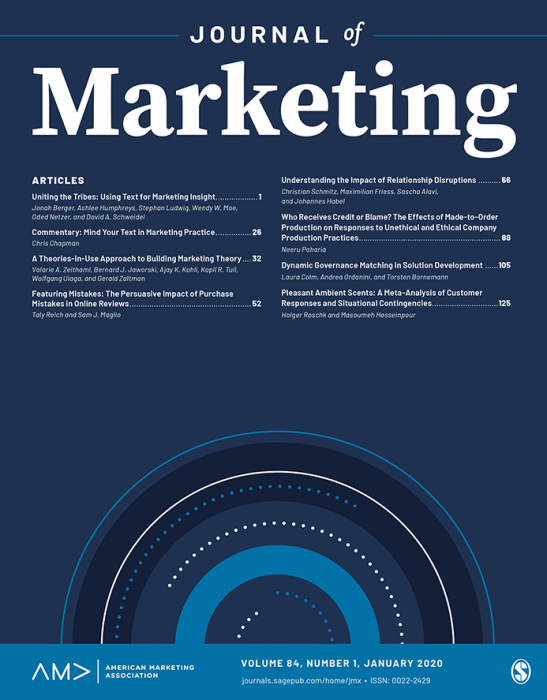EXPRESS: Adoption of New Technology Vaccines
IF 10.4
1区 管理学
Q1 BUSINESS
引用次数: 0
Abstract
Extensive research has examined the diffusion of innovations for products that can be trialed, and where the most adverse outcome, if a product fails, is a financial loss. However, less research has explored consumer responses to innovations in highly uncertain contexts characterized by health losses, lack of trialability, and the opportunity to free-ride on other’s adoption. This research focuses on vaccine decision-making as a unique case within such contexts and extends the findings to other domains. Four studies (Ntotal = 1,796, five supplementary studies, Ntotal = 643) test the propositions of a formal model that incorporates uncertainty and other’s choices into the adoption decision. The results show that consumers are surprisingly averse to products that are described as employing a new technology (e.g., mRNA technology) and require an ‘efficacy premium’ to compensate for higher perceived uncertainty. However, considerable heterogeneity exists due to individual differences in technology readiness, trust in government, and risk attitudes. Notably, despite the prominent threat of free-riding, a social proof nudge (communicating increasing population adoption) effectively reduces aversion to new technology. In this context, social proof information does not merely drive conformity or social learning, but instead increases adoption of new technology by alleviating perceived uncertainty.快讯采用新技术疫苗
对于可以试用的产品,以及产品失败后最不利的结果是经济损失的产品,已有大量研究探讨了创新的传播问题。然而,对于消费者在高度不确定的环境中对创新的反应的研究较少,这种环境的特点是健康损失、缺乏可试用性以及有机会搭乘他人采用创新的顺风车。本研究将疫苗决策作为此类背景下的一个独特案例,并将研究结果扩展到其他领域。四项研究(总计 1,796 项,五项补充研究,总计 643 项)检验了将不确定性和他人选择纳入采用决策的正式模型的命题。结果表明,消费者对被描述为采用了新技术(如 mRNA 技术)的产品出奇地反感,需要 "功效溢价 "来补偿较高的感知不确定性。然而,由于个体在技术准备程度、对政府的信任度和风险态度方面存在差异,因此存在相当大的异质性。值得注意的是,尽管 "搭便车 "的威胁很突出,但社会证明的推动(通过传播增加民众的采用率)有效地减少了对新技术的厌恶。在这种情况下,社会证明信息并不只是推动服从或社会学习,而是通过减轻可感知的不确定性来提高新技术的采用率。
本文章由计算机程序翻译,如有差异,请以英文原文为准。
求助全文
约1分钟内获得全文
求助全文
来源期刊

Journal of Marketing
BUSINESS-
CiteScore
24.10
自引率
5.40%
发文量
49
期刊介绍:
Founded in 1936,the Journal of Marketing (JM) serves as a premier outlet for substantive research in marketing. JM is dedicated to developing and disseminating knowledge about real-world marketing questions, catering to scholars, educators, managers, policy makers, consumers, and other global societal stakeholders. Over the years,JM has played a crucial role in shaping the content and boundaries of the marketing discipline.
 求助内容:
求助内容: 应助结果提醒方式:
应助结果提醒方式:


